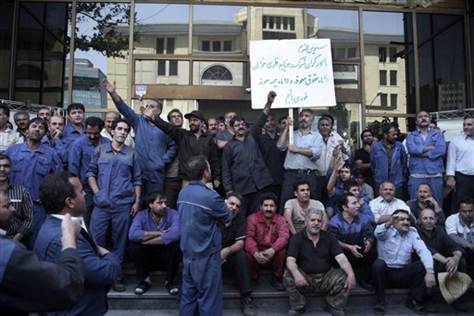Iranian workers protest over unpaid wage in front of the Ministry of Industry, 14 August 2012
Arseh Sevom, the NGO promoting civil society and human rights in Iran, resumes its weekly review of developments inside the Islamic Republic:
Another Day Older and Deeper in Debt
According to Human Rights Activists News Agency (HRANA) [fa], the Saipa car factory in Kashan has dismissed more than 10,000 employees. Saipa in Tehran has also reduced the shifts from three to just one. Asr-e Iran reports that the automobile production rate has been reduced by 66.2%.
More than 600 steel workers demonstrated in front of the Ministry of Labor, demanding five months of unpaid wages. The protest was a follow-up
to the workers' claim of eight months of unpaid salaries --- despite a settlement, only three months were paid.About 200 members of Tehran’s Metropolitan Vahed Bus Company gathered Wednesday in front of the Tehran Municipal Building to protest discrimination in pay. They also called for the dismissal of the managing director of the company and an investigation into their unpaid salaries.
The syndicate of the Vahed company workers is among the most active labor unions in Iran. Members such as Mansoor Osanloo and Ebrahim Madadi have been imprisoned for demanding the right to assemble.
Amid the recent currency instability and rising inflation, the International Monetary Fund (IMF) published statistics on Iran assured that the blow from sanctions would be limited. The reliability of the report has been questioned, as it is primarily based on the statistics provided by the Government.
Empty Skies Over Iran
Because of difficulties in financial transactions, Air France, British Airways, and Malaysia’s Air Asia have all suspended their flights to Iran. Aftab [fa] reports that Tajikistan Air has also joined the others in suspending flights to Tehran temporarily. The ticket price of domestic flights will also increase 50%.
Sanctions Sting Population While Sparing Elite
Tejarat [fa] reports that 90 types of medicine are now unavailable. A statement from the United Nations Secretary General noted, "The sanctions have had significant effects on the general population, including an escalation in inflation, a rise in commodities and energy costs, an increase in the rate of unemployment and a shortage of necessary items, including medicine."
UN Special Rapporteur’s Third Report on Human Rights in Iran
United4Iran’s analysis of the report of UN Special Rapporteur Ahmed Shaheed highlights that the Islamic Republic has violated the International Covenant on Civil and Political Rights, as it fails to guarantee freedoms of expression, assembly, and association and serves to “primarily protect Government interests rather than the interests of Iranian citizens". Labour rights have been severely curtailed, and any effort by labour rights activists to organise has been met with harsh penalties and violent repression.
Currently all unions are banned in the country.
Addicted to Death
Several organisations have released a statement questioning international support for drug trafficking prevention as long as execution for drug offences remains in place in Iran.
HRANA reports [fa] that approximately 200 relatives of detainees on Death Row gathered outside the Supreme Leader's house last Wednesday to call for a halt to executions.
The New York Times in its report on Iranian efforts to prevent the flow of illegal drugs provides the human cost to Iranian police in dealing with the drug flow, reporting that 3900 officers have lost their lives on the border.
Antonino de Leo, the Italian representative for the United Nations drug office in Tehran, said he was also bothered by the increase in executions, but noted that the punishments were meted out by Iran’s judiciary, not by its police force.
Amnesty International has released a report: Addicted to Death, which examines the use of the death penalty for drug-related offenses. It notes that Iran receives funding for its efforts from the United Nations Office on Drugs and Crime. One of the mandates of the funding is to bring Iran in line with international law, but Amnesty questions:
It is not clear...to what extent UNODC has promoted the inclusion of adherence to international human rights standards within these projects. UNODC worked with the Drug Control Headquarters and the Iranian Judiciary over drafting the revised Anti-Narcotics Law, which came into force in January 2011, and which extended the scope of the death penalty, despite UNODC’s objectives over law reform. What is clear is that senior UNODC officials have done little to raise concerns about the imposition of the death penalty for drugs offences in Iran in their public dealings with the country.”
